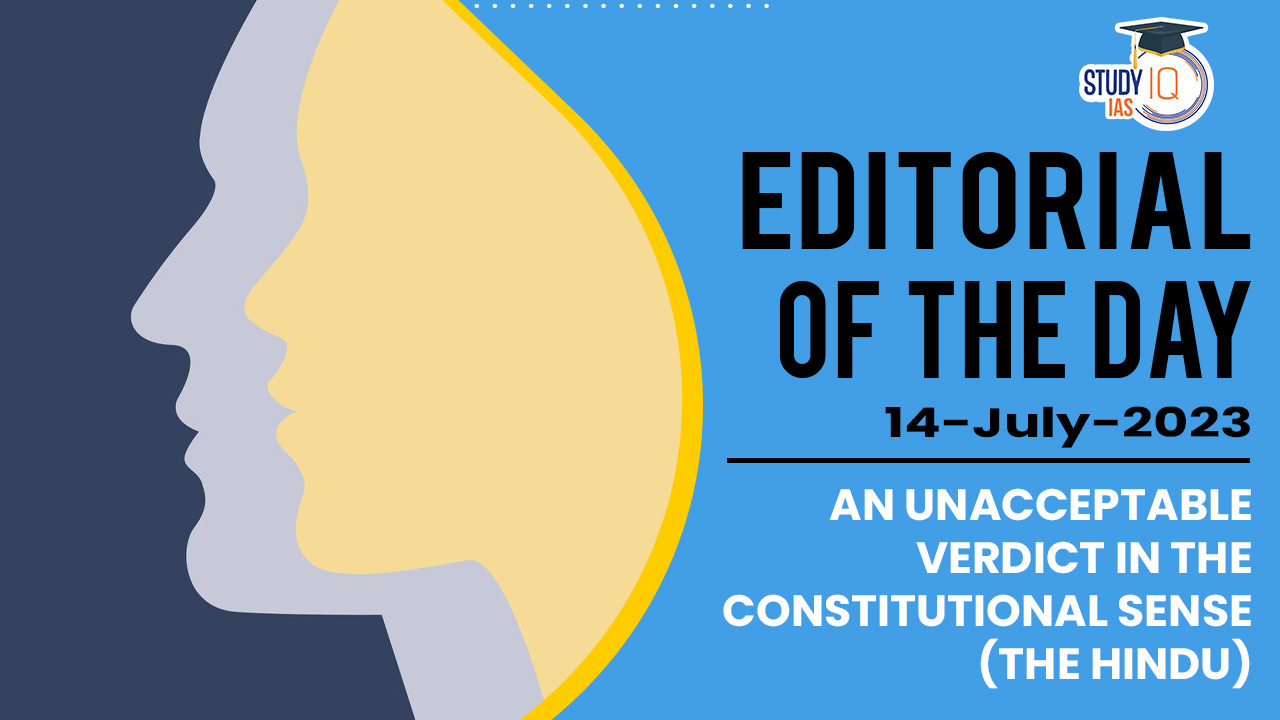Table of Contents
Context: The article is discussing a recent judgement by the Allahabad High Court that pertains to a petition filed by an interfaith couple who are in a live-in relationship, seeking protection from police harassment. However, the High Court declined their prayer and made certain observations that have generated controversy. The article argues that the judgement goes against the principles of constitutional morality in personal relations. It suggests that the High Court relied more on conventional social morality rather than considering the constitutional principles of individual autonomy and personal liberty. The article further criticises the High Court for disregarding previous Supreme Court judgments on live-in relationships and providing questionable reasons for doing so.
Background
What is Constitutional Morality:
Constitutional Morality means adherence to or being faithful to bottom line principles of constitutional values.
- It includes commitment to inclusive and democratic political process in which both individual and collective interests are satisfied.
- In the context of the constitution of India, the constitutional values are Democracy, Socialism, Equality and Integrity etc. briefly it is the preamble which clarifies the constitutional values.
Significance of Upholding Constitutional Morality:
- Rule of Law: Constitutional morality ensures the establishment of the rule of law in a society by integrating the changing aspirations and ideals of the people.
- Preserving Trust: Constitutional morality acts as a governing ideal that highlights the need to preserve the trust of the people in democratic institutions. It fosters cooperation and coordination among individuals to pursue constitutional aspirations collectively.
- Impacting Social Morality: Constitutional morality can use laws and forms to impact and transform prevailing social morality. By abolishing practices like Sati through legislation, the rights to dignity and life were extended to widows, influencing societal perceptions.
- Recognizing Plurality and Diversity: Constitutional morality recognizes the plurality and diversity of society. It aims to make individuals and communities more inclusive by providing scope for improvement, reforms, and reaffirming the rights of marginalised groups.
Concerns Associated with Upholding Constitutional Morality:
- Lack of Clear Definition: The term “constitutional morality” has not been clearly defined by the Supreme Court, allowing subjective interpretations by individual judges, which can lead to inconsistency and uncertainty in its application.
- Top-Down Approach: The imposition of constitutional morality through judicial decisions can hinder the organic emergence of solutions to ethical problems in society. It may restrict the democratic process and public deliberation.
- Violation of Separation of Powers: Critics argue that upholding constitutional morality can result in judicial supremacy over parliamentary supremacy, undermining the principle of separation of powers and the democratic functioning of the government.
- Judicial Overreach: Some view the application of constitutional morality as judicial overreach, pitting it against societal or popular morality. There is concern that it could lead to an excessive interference of the judiciary in matters that are better left to the elected representatives and the democratic process.
Supreme Court on Constitutional Morality:
- Constitutional morality extends beyond the literal adherence to constitutional provisions and is based on fundamental values such as individual autonomy, liberty, equality without discrimination, recognition of identity with dignity, and the right to privacy.
- It entails upholding the core principles of constitutional democracy.
- For instance, in the Supreme Court’s verdict on the Sabarimala temple case, constitutional morality prevailed by reinstating religious freedom, gender equality, and the right of women to worship as guaranteed under Articles 14, 21, and 25 of the Constitution.
-
- The practice of banning women of a certain age from entering the temple was deemed unconstitutional, as it contradicted constitutional values and opposed social morality that discriminates against women based on biological reasons like menstruation.
- Several other Supreme Court judgments have also contributed to the definition of constitutional morality:
-
- Kesavananda Bharati Case: The Supreme Court curtailed the power of Parliament to violate the Basic Structure of the Constitution, emphasizing the significance of constitutional morality.
- Naz Foundation case: The Supreme Court stated that constitutional morality, rather than public morality, should prevail. This distinction highlights the importance of aligning legal and social norms with constitutional principles.
- Lt Governor of Delhi case: The Supreme Court emphasized constitutional morality as a guiding principle to preserve public trust in the democratic institution.
Decoding the Editorial
Understanding the HC Judgement:
- The Allahabad High Court judgement in the case of Kiran Rawat vs State of UP pertains to an interfaith couple in a live-in relationship seeking protection from police harassment.
- The judgement has been widely discussed due to its implications for constitutional morality in personal relations and its departure from earlier Supreme Court verdicts on live-in relationships.
- The petitioners, a Muslim man and a Hindu woman, claimed that they were being harassed by the local police while living together in a rented house. They sought protection from such harassment, allegedly stemming from a complaint made by a family member.
- The article argues that the Allahabad High Court’s judgement is problematic from a constitutional standpoint for several reasons.
-
- Firstly, it suggests that the court prioritized conventional social morality over the constitutional principles of individual autonomy and personal liberty. This is seen as a departure from the Supreme Court’s repeated affirmation of these principles.
- Secondly, the article highlights that the High Court disregarded several Supreme Court judgments on live-in relationships, even though it cited them. The reasons given by the High Court for discarding these judgments are considered untenable.
- Thirdly, the High Court is criticized for delving into personal laws on marriage, which are irrelevant to the case. This indicates that the court went beyond its purview and considered factors that were not legally pertinent.
- The Allahabad judgement stated that previous Supreme Court verdicts on live-in relationships, such as D. Velusamy (2010), Indra Sarma (2013), and Dhanu Lal (2015), were not intended to promote such relationships.
- The High Court also asserted that the law traditionally favours marriage over live-in relationships. This implies that the High Court rejected the precedential value of these Supreme Court verdicts.
- Additionally, the High Court is said to have made an unnecessary reference to Section 125 of the Criminal Procedure Code (Cr.PC), which pertains to maintenance for wives and not “other women.”
- The judgment also mentioned that extramarital and premarital sex are not recognized under Muslim law, and even acts like kissing, touching, and staring prior to marriage are considered ‘Haram’ (prohibited) in Islam.
Inclination towards Orthodoxy:
- The recent High Court verdict has displayed an inclination towards social orthodoxy and religious revivalism.
- The High Court seems to have acted as a theological court, disregarding the principles of individual liberty and autonomy inherent in the writ jurisdiction.
- The article argues that the High Court’s verdict exhibited a tendency to reiterate traditional beliefs on marriage and morals, rather than upholding the constitutional principles of individual rights and freedoms.
- Furthermore, the article emphasizes that Supreme Court verdicts on fundamental rights are not merely inter-party disputes, but binding on all courts in the country under Article 141 of the Constitution.
- It asserts that the Supreme Court’s role in constitutional adjudication is not about promoting or discouraging social practices or human conduct, but about upholding constitutional principles and limiting the state’s power in personal choices.
-
- For eg: In Joseph Shine vs Union of India and Navtej Singh Johar, the Supreme Court decriminalised adultery and struck down Section 377 of the Indian Penal Code respectively.
Upholding Personal Liberty:
- In Lata Singh (2006) and S. Khushboo vs Kanniammal & Anr. (2010), the Supreme Court recognized the right to inter-caste and inter-religious marriages and affirmed that consensual sexual relations outside of marriage are not a statutory offense.
- However, the Allahabad High Court, in the case being discussed, disregarded the propositions of law established by the Supreme Court.
- The High Court claimed that the Supreme Court’s observations in those judgments were specific to the facts of those particular cases and not binding as precedents on all cases involving fundamental rights.
- This approach by the High Court is criticized for undermining the importance of the law laid down by the Supreme Court.
Beyond the Editorial
Therefore, It is important to strike a balance between upholding constitutional morality and respecting the democratic principles and values that underpin a pluralistic society.


 SSC CGL Exam 2025 Apply Online Starts Ap...
SSC CGL Exam 2025 Apply Online Starts Ap...
 Daily Quiz 19 April 2025
Daily Quiz 19 April 2025
 Vehicle-to-Grid (V2G) Technology and its...
Vehicle-to-Grid (V2G) Technology and its...





















